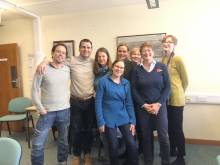New Global Competence in Teacher Education Project Launches with an Erasmus+ Grant
 Posted date: 29 Jan 2020
Posted date: 29 Jan 2020
Häme University of Applied Sciences (HAMK) together with the University of Hull and three other universities, AFS Intercultural Programs (AFS) and the European Federation for Intercultural Learning (EFIL) in Europe have been awarded a Erasmus+ research and programme development grant of €443,540 to advance global competence in teacher education.
Shared global challenges including the climate crisis, rising nationalism and economic injustices, coupled with the advances of the Fourth Industrial Revolution, demand that education systems better prepare learners to embrace flexibility, innovation and work across differences in order to find sustainable solutions together. Global competence is a key learning approach to do this. It encompasses the abilities to master new literacies (e.g. digital, information, media) from multiple perspectives, develop an understanding and appreciation of different cultures, values, beliefs and systems, become an able and adaptive communicator, and learn how to work effectively and appropriately with others.
Yet, initial research shows that global competence has not yet been widely incorporated within higher education programs for future teachers in most countries. As a result, new teachers leaving university are often unaware of the need for global competence or how to include it in their curricula.
The Global Competence in Teacher Education project will directly address this challenge by working with teacher educators and trainee teachers to develop future cohorts of teachers in Europe and beyond who are both globally competent themselves and have the skills to develop global competence in their students.
Begun in September 2019, the project will last three years and establish an international Global Competence Network of Educators to help the project consortium analyse and develop global competence curricula, materials and trainings within national teacher education programs. This project will also foster better intercultural education practices, including through teacher and student mobility and the use of virtual reality technology to enable non-mobility based experiences and sharing.
The Global Competence in Teacher Education consortium partners include:
? University Of Hull, United Kingdom (Lead organiser)
? AFS Intercultural Programs (AFS), United States
? European Federation for Intercultural Learning (EFIL), Belgium
? Häme University of Applied Sciences (HAMK), Finland
? Hellenic Open University (HOU), Greece
? University College Leuven-Limburg (UCLL), Belgium
? Università Degli Studi Di Genova, Italy
The consortium partners bring strong experience in project topics, knowledge of European and global realities, and connections with schools? and other education stakeholders – all necessary for developing relevant resources and outcomes.
The project partners are initially working on a scoping study and curriculum mapping exercise to gain a better understanding of the existing policies, structures and best practices in global competence education for teachers. Teachers will be directly involved in this activity to help shape the design of improved training practices. Study results will be published in journals and presented at conferences worldwide to inform teacher educators, policy-makers and researchers.
Shared global challenges including the climate crisis, rising nationalism and economic injustices, coupled with the advances of the Fourth Industrial Revolution, demand that education systems better prepare learners to embrace flexibility, innovation and work across differences in order to find sustainable solutions together. Global competence is a key learning approach to do this. It encompasses the abilities to master new literacies (e.g. digital, information, media) from multiple perspectives, develop an understanding and appreciation of different cultures, values, beliefs and systems, become an able and adaptive communicator, and learn how to work effectively and appropriately with others.
Yet, initial research shows that global competence has not yet been widely incorporated within higher education programs for future teachers in most countries. As a result, new teachers leaving university are often unaware of the need for global competence or how to include it in their curricula.
The Global Competence in Teacher Education project will directly address this challenge by working with teacher educators and trainee teachers to develop future cohorts of teachers in Europe and beyond who are both globally competent themselves and have the skills to develop global competence in their students.
Begun in September 2019, the project will last three years and establish an international Global Competence Network of Educators to help the project consortium analyse and develop global competence curricula, materials and trainings within national teacher education programs. This project will also foster better intercultural education practices, including through teacher and student mobility and the use of virtual reality technology to enable non-mobility based experiences and sharing.
The Global Competence in Teacher Education consortium partners include:
? University Of Hull, United Kingdom (Lead organiser)
? AFS Intercultural Programs (AFS), United States
? European Federation for Intercultural Learning (EFIL), Belgium
? Häme University of Applied Sciences (HAMK), Finland
? Hellenic Open University (HOU), Greece
? University College Leuven-Limburg (UCLL), Belgium
? Università Degli Studi Di Genova, Italy
The consortium partners bring strong experience in project topics, knowledge of European and global realities, and connections with schools? and other education stakeholders – all necessary for developing relevant resources and outcomes.
The project partners are initially working on a scoping study and curriculum mapping exercise to gain a better understanding of the existing policies, structures and best practices in global competence education for teachers. Teachers will be directly involved in this activity to help shape the design of improved training practices. Study results will be published in journals and presented at conferences worldwide to inform teacher educators, policy-makers and researchers.
Posted By

GSP Admin




